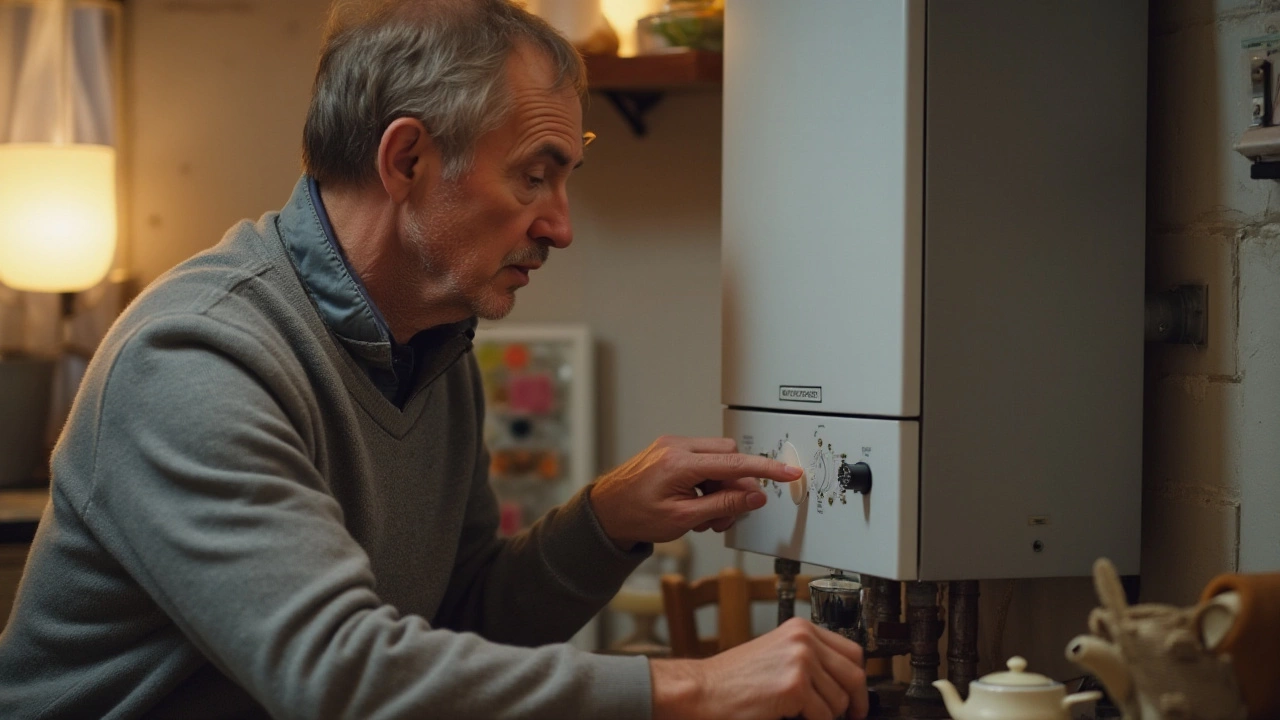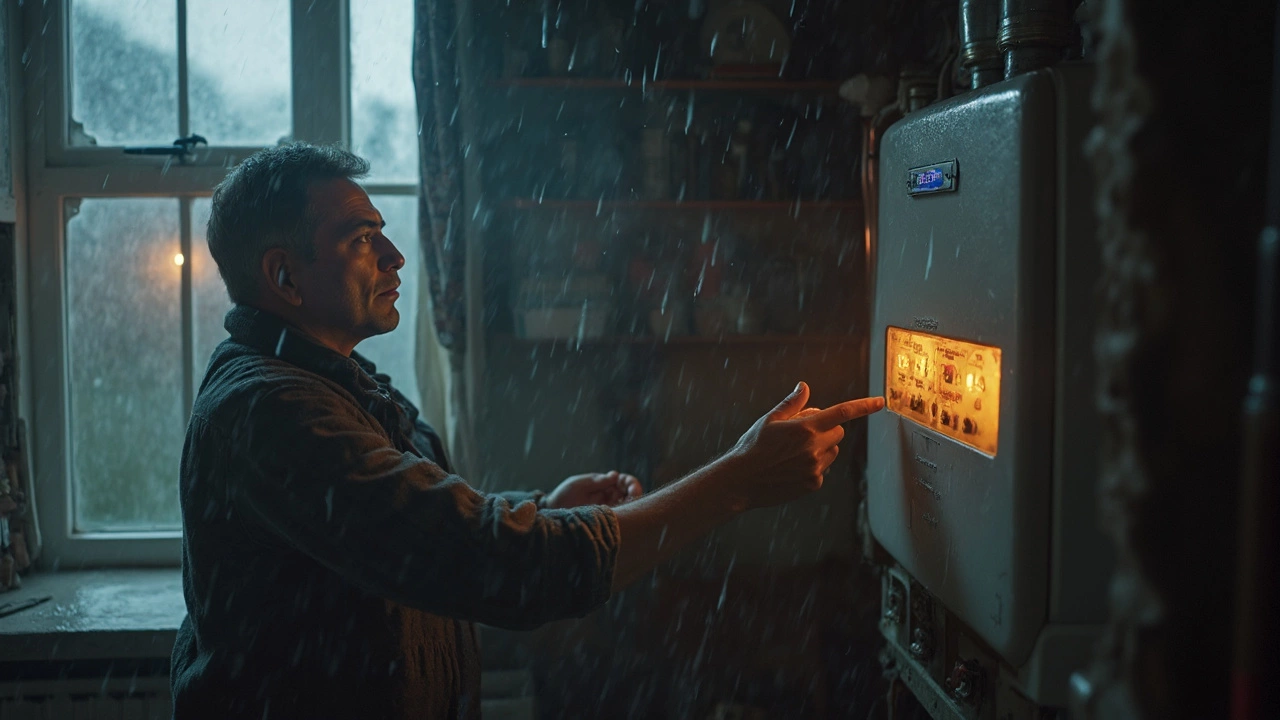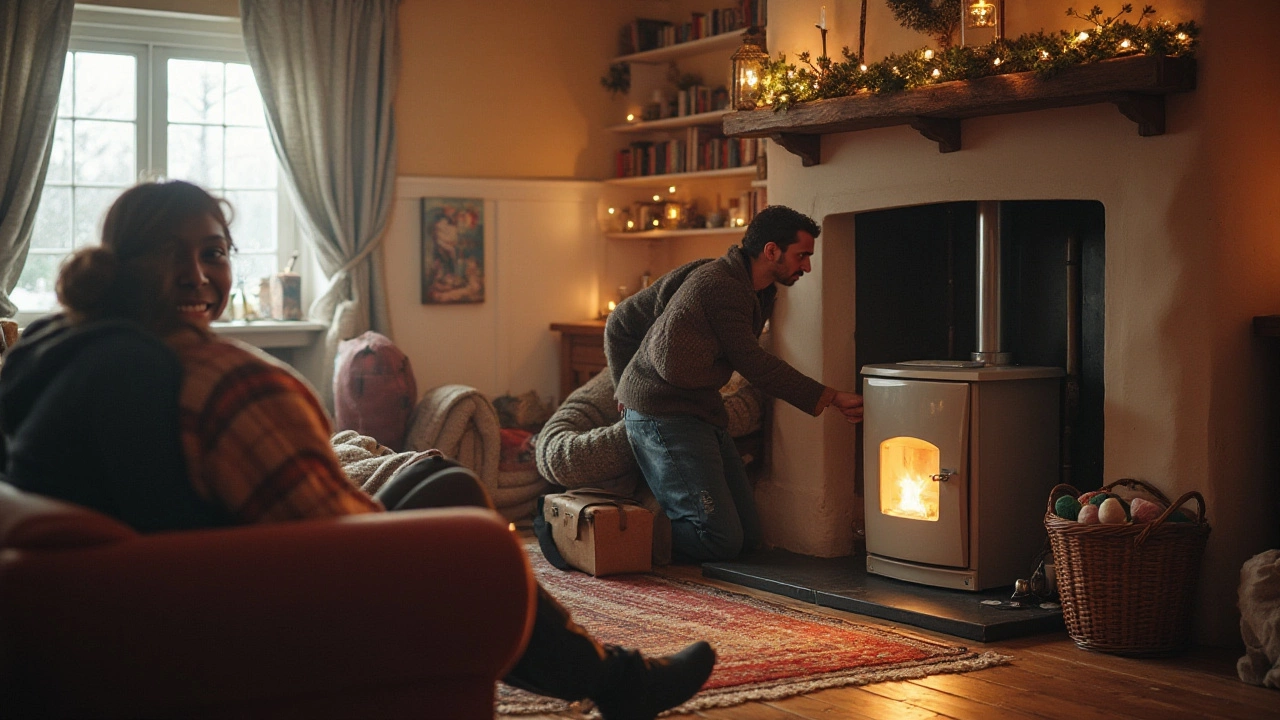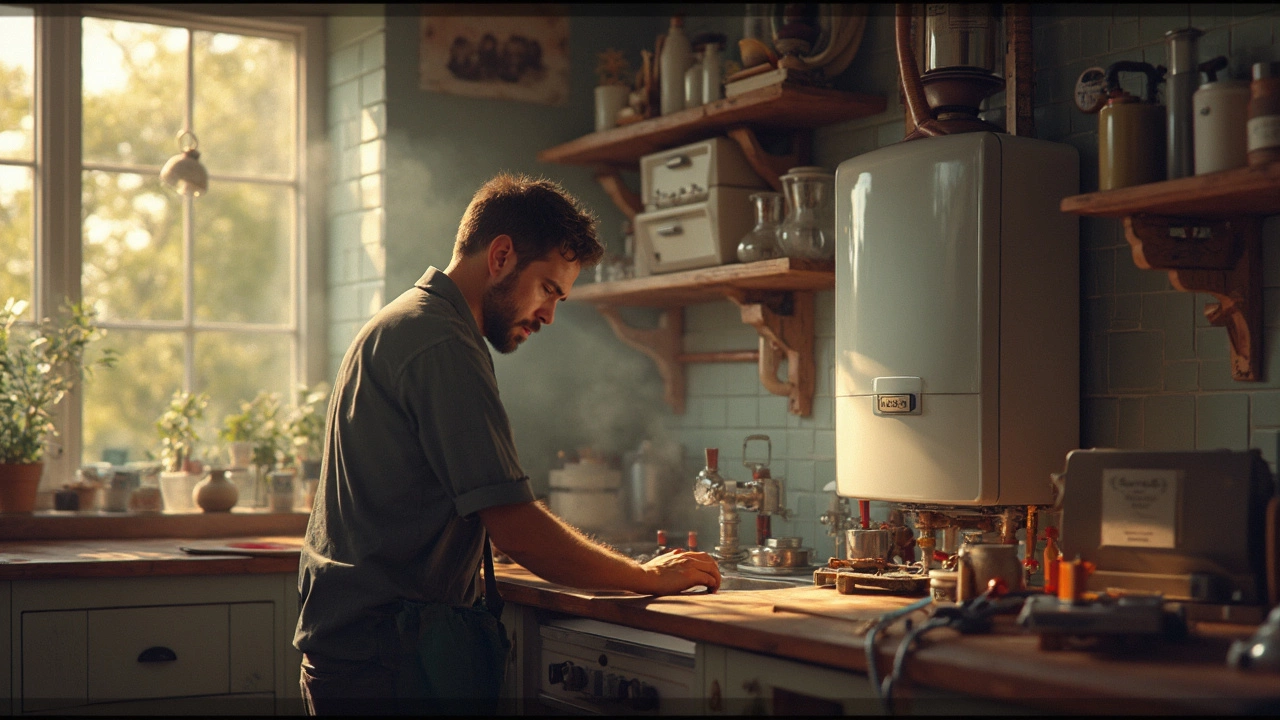
- 26 Mar 2025
- Gideon Thornton
- 0
Ever glanced at your clunky old boiler and thought, 'Do I call a plumber for this?' You're not alone. A lot of folks are uncertain about whether plumbers handle boiler installations or if that's a job for an HVAC specialist. Here's the skinny on it: plumbers do install boilers, but there are some nuances.
In general, plumbers are your go-to experts for anything to do with pipes. Since boilers connect to your heating system, which involves pipes, a plumber is equipped to handle the job. However, for more complex setups, like intricate heating networks, you might want to rope in an HVAC technician. It all depends on the particularities of your system and state regulations.
- Understanding Plumbers' Roles
- Boiler Installation Basics
- When to Call a Specialist
- Tips for Choosing the Right Professional
- Boiler Maintenance Advice
Understanding Plumbers' Roles
If you're scratching your head about whether plumbers handle boiler installation, it's time to clear up the confusion. Plumbers are trained not just in fixing leaks and unclogging drains but also in installing and maintaining various heating systems, including boilers. Here's how they fit into the picture.
Plumbers are the backbone of any home's heating system because they deal directly with the network of pipes that deliver hot water and control heating. When it comes to boiler repair, plumbers are skilled in connecting the boiler’s system to the necessary piping and ensuring everything is sealed tight and working safely. This is crucial not only for efficiency but also for safety.
When Is a Plumber Your Best Choice?
Plumbers are the right choice when the boiler installation or repair mainly involves handling pipes. For instance, replacing an old boiler with a similar model or fixing a routine issue falls neatly within their scope of work.
However, there are times when the tasks become more complex. Imagine dealing with digital or smart systems integrated into modern heating setups. In such cases, the expertise of HVAC professionals might be appropriate. But for many standard residential installations, a plumber is perfectly capable.
Making the Right Decision
Consultations with a qualified plumber can often shed light on whether their services alone will suffice. It’s always smart to have a trusted professional assess the situation. Ask about their experience with the specific boiler model you’re considering and whether they've handled similar installations.
The Basics: Licensing and Qualifications
Most importantly, ensure that the plumber is licensed and has the needed qualifications to work on your boiler installation. Most U.S. states require specific licenses for plumbers, and this often includes certifications for handling heating systems. Don't be shy about asking for proof; reputable plumbers won't mind.
| Task | Plumber | HVAC Specialist |
|---|---|---|
| Pipe installation | ✔ | |
| Basic boiler fix | ✔ | |
| Smart system setup | ✔ | |
| Complex diagnostics | ✔ | ✔ |
Boiler Installation Basics
Alright, let's talk about the nuts and bolts of getting a boiler installation done right. Whether it's an upgrade or a brand new install, knowing what to expect can save you a lot of hassle and maybe even some cash.
Choosing the Right Boiler
The first step in any boiler installation is picking the right boiler for your home. Do you need a combi, system, or regular boiler? Combi boilers are great for saving space since there's no need for a separate water tank. But if you've got more than one bathroom, a system boiler might better meet your needs.
Make sure to consider the unit's efficiency ratings. A high-efficiency boiler means lower bills, and who doesn't love saving on energy costs?
The Installation Process
The actual installation is a bit more involved than you might think. Here’s a quick peek into the usual steps:
- Survey and Plan: The plumber kicks off by checking your current setup and mapping out the installation plan.
- Disconnecting Old Units: If there’s an old boiler in place, it needs to be safely disconnected.
- Position the New Boiler: The new boiler is placed and secured, typically where the old one was, to reduce changes in your property.
- Connect the Pipes: Here’s where the plumber's skills shine. Properly connecting the boiler to the water and heating pipes is crucial.
- Check Controls and Safety: Before they wrap up, installers test all safety controls and make sure the system is working right.
Regulations and Safety
Here's where things can get a bit serious. It's essential to ensure that all installations meet local building codes and safety regulations. For instance, in some areas, a Gas Safe registered engineer is a requirement for certain boiler types.
Proper ventilation is another must-have. It's not just about meeting legal requirements; it's about keeping your home safe from carbon monoxide leaks.
Cost Considerations
Expect to lay down some cash, but don't worry, it's an investment. A typical install could set you back anywhere from $3,000 to $5,000, depending on the specifics.
And if you’re thinking about financing, many companies offer payment plans to spread the cost.
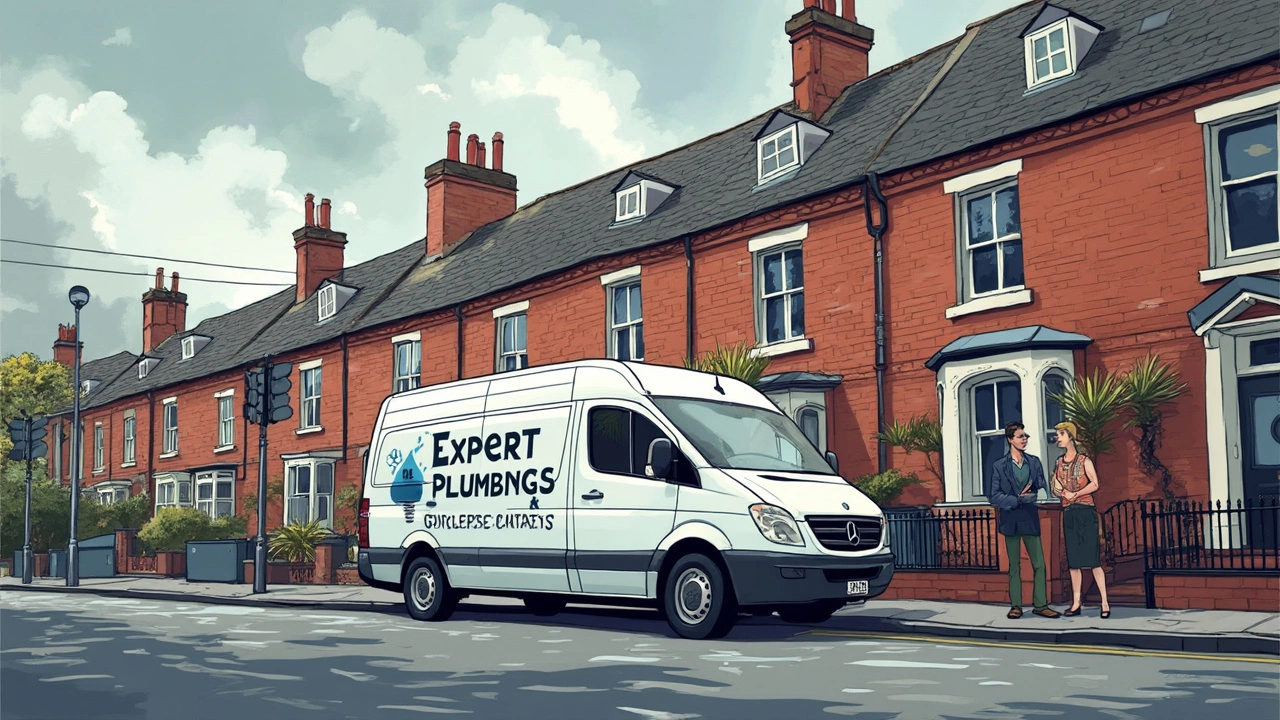
When to Call a Specialist
So, when do you actually need to dial up a specialist rather than your trusted neighborhood plumber? Well, it really boils down to the complexity of your boiler installation needs and local regulations. Let's dig a bit deeper.
Complex Systems
If your heating system seems more like a maze than a straightforward setup, you might need someone who lives and breathes HVAC systems. Boilers that are integrated with smart home systems or those that require precise calibration could benefit from a specialist's expertise.
Specialists have a deep understanding of the intricacies involved in complex systems, ensuring everything runs smoothly and efficiently.
Regulations and Certifications
Some places have specific rules about who can work on boiler repair and installation. Check if your area requires HVAC certified technicians for certain types of installations. A specialist usually has all the necessary certifications and stays up-to-date with industry standards.
Troubleshooting and Repairs
When your boiler isn't just acting up but throwing a full-blown tantrum, a specialist might be your best bet. From strange noises to inconsistent heating, specialists diagnose and fix issues that might baffle others.
Insurance and Warranty Work
Let’s not forget about insurance and warranties. Some policies require that a certified professional handle any work on your system to avoid nullifying coverage. Always verify with your insurance provider or warranty terms.
If you're ever in doubt, it doesn't hurt to consult with a specialist first, even if it's just for peace of mind. Better safe than sorry, right?
Tips for Choosing the Right Professional
Picking the right expert to handle your boiler needs can feel like solving a puzzle. But with a few key pointers, you'll be more than ready to find the perfect match.
Understand Your Needs
Before grabbing the phone, figure out what exactly you need. If you're installing a new boiler from scratch, make sure to check if it's a job for a regular plumber or an HVAC expert. The more specific you are about your needs, the better.
Check Qualifications
Credentials are crucial. Look for professionals with proper certifications in boiler repair and installation. They're your guarantee for safe and legal work. Most states require licenses, so don't shy away from asking for proof.
Look for Experience
Experience speaks volumes. An expert who has handled numerous boiler installations is more likely to do a flawless job. Don't just go by years—ask about previous jobs and even seek references if needed.
Read Reviews
Customer reviews can be a goldmine of information. They'll tell you about the professional's reliability, quality of work, and customer service. Look for detailed reviews that mention both good and bad experiences.
Get Multiple Quotes
Shopping around pays off. Get quotes from at least three different professionals. This'll give you a sense of the going rate, and you can see who offers the best value. Remember, the cheapest option isn't always the best.
| Factor | Importance Level |
|---|---|
| Qualifications | High |
| Experience | High |
| Price | Medium |
| Customer Reviews | High |
With these pointers, you're well on your way to finding the right professional for your boiler project without breaking a sweat.

Boiler Maintenance Advice
Keeping your boiler in tip-top shape should be high on your home maintenance checklist. Regular upkeep not only extends the life of your boiler but also ensures it runs efficiently, saving you from surprise breakdowns and hefty bills.
Regular Checks Are Key
First things first, you'll want to regularly check your boiler pressure. If it's too high or too low, your heating might not work properly. Ideally, you should aim for a steady range between 1 and 2 on the pressure gauge. If you're not seeing those numbers, it's worth calling a plumber to get it sorted.
Annual Servicing
Don't skip the annual service, seriously. A trusted professional should inspect, clean, and test your boiler every year. This routine check keeps your system running smoothly and safely, plus it might even be required to keep your warranty valid.
Bleed Your Radiators
If you're hearing strange noises or noticing cold spots, it might be time to bleed the radiators – a simple DIY task. Just pop open the valve and release the trapped air. This boosts your system's efficiency, saving energy and money.
Keep Things Clean
Make sure the space around your boiler is clear of any clutter or debris. Good airflow keeps the system running cool and efficiently. Also, dust can be a silent culprit, so give it a wipe-down every now and then.
"A well-serviced boiler is not only safer but also more efficient," says Dr. Helen Watts, a heating engineer with over two decades in the field. "Neglecting maintenance is the quickest route to costly repairs."
Monitor for Leaks
Leaks are never a good sign. If you spy water around the boiler or feel dampness, spot-check for visible leaks. If you find any, it's time to bring in a boiler repair expert.
Mind the Pilot Light
Your pilot light should be a crisp blue. If it's any other color, particularly yellow, it's a warning sign that something's up and needs a professional eye.
Sticking to these maintenance tips isn't just good practice; it keeps you warm without the unexpected chaos of boiler malfunctions. Plus, regular care is better than waiting for something to go wrong, trust me on this one. Stay proactive and save yourself the headaches.


